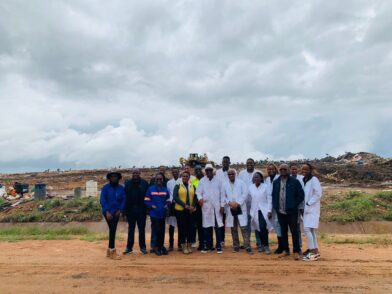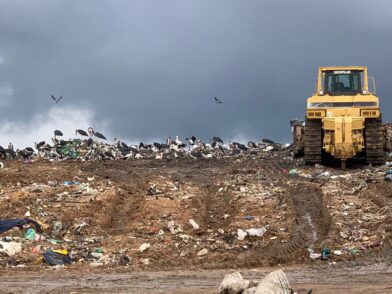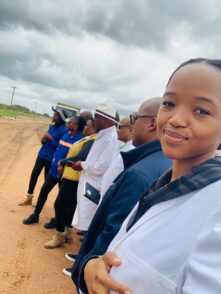Gaborone City Council and University of Botswana Partnership Brings Students to the Forefront of National Waste Management Challenges
Metrics
Community
GaboroneCommunity Size
246,325University
University of BotswanaYears
2023Status
CompletedCase Type
Partnership StoriesFocus Areas
Waste ManagementRegion
AfricaUniversity Department Code
Ecological Impact AssessmentSustainable Development Goals
06 Clean Water and Sanitation, 11 Sustainable Cities and CommunitiesFollowing a series of training sessions conducted by EPIC Africa in Durban (2020), Gaborone, Harare, and Windhoek (2022), the Gaborone City Council (GCC) and the University of Botswana (UB) began formally collaborating to address various pressing challenges in the city related to waste management and urban planning. To kick off this partnership, the GCC coordinated a half-day city tour of Gaborone on February 16th with staff from a regional landfill to request assistance with the city’s issues with solid waste management and illegal rubbish dumping. Tour attendance included six academic staff from the University of Botswana, as well as six students currently enrolled in a course on Ecological Impact Assessment. Professor Hillary Masundire, the University of Botswana EPIC Lead, helped coordinate the staff and students in attendance.

In hopes of gaining an appreciation for the complexity of challenges currently plaguing waste management efforts, the tour group visited two illegal waste dumping sites, as well as the regional landfill that services several local government authorities. Due to collection staff shortages, waste management vehicle failures, infrequent collection times, and long distances to viable dump sites (over 40 kilometers), many city residents engage in illegal or hazardous dumping activities to get rid of their rubbish. However, even the rubbish that does make it to the proper facilities creates issues, something that Professor Masundire quickly recognized as a result of rainy weather conditions during the tour:
“It is a compounded problem, really,” says Masundire. “When it rains, improperly managed rubbish leaches hazardous chemicals and other unsafe materials into streams and rivers that surrounding communities are then exposed to. Children play in the water and are now facing serious health risks.”

Improper spatial planning during the creation of regional landfills, as well as insufficient sorting both at the source and during rubbish collection, means that local resident health is often unknowingly jeopardized. Additionally, when rubbish is not carefully managed landfill fires caused by methane gas leaks can also pose a threat to surrounding communities and their homes. The students in attendance during the tour quickly noticed the complexity of these issues and were eager to suggest potential solutions incorporating hydrology, ecology, economic waste buyback, and community education programs. A student named Gosego Serema commented, “There is a lot that the public does not know about issues of waste management that I believe, if they knew, things would be so much better.”
However, these problems cannot be remedied by community behavior changes alone. After witnessing the hazards and improper waste management first-hand during the tour, another student, Kago Maikano, stated: “I think extra efforts should be made to involve other government departments or parastatals with the GCC to deal with challenges like gas emissions and leachade outflows before they get out of hand and affect not only the environment at an ecosystem level, but at a climate level as well. This will only lead to more adverse effects that may have not been foreseen.”
“I think the most impactful part of the tour for our group was seeing how the people of Gaborone are impacted,” says Masundire. “There are people here who need to be protected, and the work that we are hoping to do with the city to fix it is truly urgent.”

Moving forward, Professor Masundire shared that there are many ideas for addressing the complex waste management problems at hand. For example, a resident education initiative provides substantial information and training on how to properly sort rubbish before collection to minimize community exposure to hazardous materials. He hopes that young people and University of Botswana students can be at the forefront of those future projects, too. The students in attendance during this tour were able to interact with city council members, as well as see real life applications of the skills they are learning in their courses. Professor Masundire is confident that including students in these continuing efforts to address waste management in Gaborone will not only inspire research within the university, but will also result in innovative solutions to complex problems from the next generation of leaders. Connecting students with real life issues is the heart of the EPIC model.
The University of Botswana hopes to continue engaging students and staff in future waste-related projects, as well as maintain strong ties to the GCC. In the coming months the GCC will host a meeting with the University to discuss persisting problems within landfill operation, as well as opportunities for student research and project proposals. During the new academic year, Professor Masundire hopes to invite more students to tour the site and become involved with project initiatives, as well as showcase student proposals and research findings during symposiums later this year and early next year. International collaboration may also be on the horizon for this initiative as communications are made with European cities tackling similar problems. The results of this GCC-UB initiative will prove to be crucial not only for Botswana, but for countless cities around the world struggling to improve their waste management situations.

